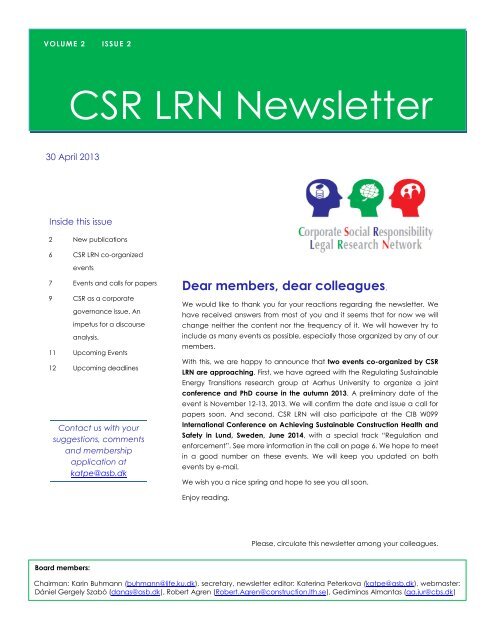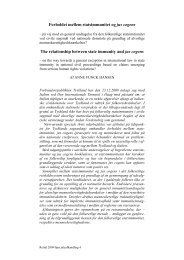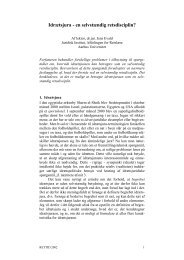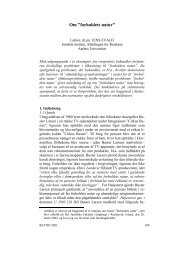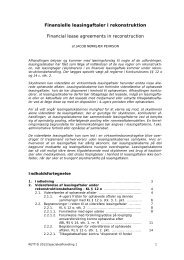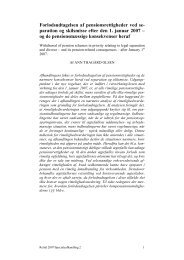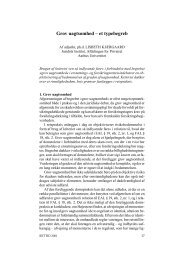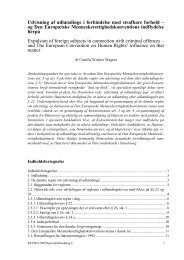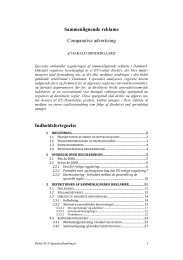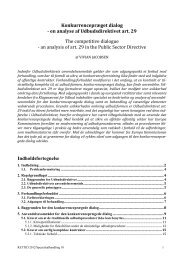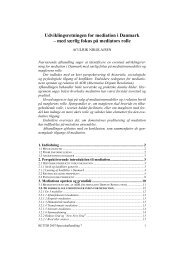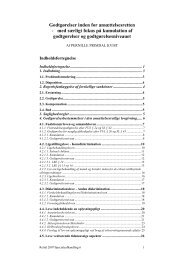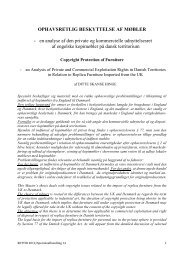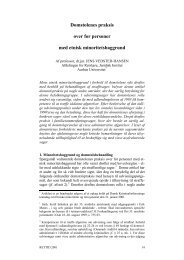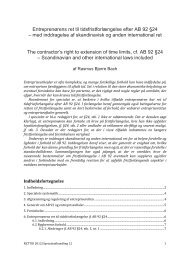CSR LRN Newsletter
CSR LRN Newsletter
CSR LRN Newsletter
- No tags were found...
Create successful ePaper yourself
Turn your PDF publications into a flip-book with our unique Google optimized e-Paper software.
VOLUME 2 ISSUE 2<strong>CSR</strong> <strong>LRN</strong> <strong>Newsletter</strong>30 April 2013Inside this issue2 New publications6 <strong>CSR</strong> <strong>LRN</strong> co-organizedevents7 Events and calls for papers9 <strong>CSR</strong> as a corporategovernance issue. Animpetus for a discourseanalysis.11 Upcoming Events12 Upcoming deadlinesContact us with yoursuggestions, commentsand membershipapplication atkatpe@asb.dkDear members, dear colleagues,We would like to thank you for your reactions regarding the newsletter. Wehave received answers from most of you and it seems that for now we willchange neither the content nor the frequency of it. We will however try toinclude as many events as possible, especially those organized by any of ourmembers.With this, we are happy to announce that two events co-organized by <strong>CSR</strong><strong>LRN</strong> are approaching. First, we have agreed with the Regulating SustainableEnergy Transitions research group at Aarhus University to organize a jointconference and PhD course in the autumn 2013. A preliminary date of theevent is November 12-13, 2013. We will confirm the date and issue a call forpapers soon. And second, <strong>CSR</strong> <strong>LRN</strong> will also participate at the CIB W099International Conference on Achieving Sustainable Construction Health andSafety in Lund, Sweden, June 2014, with a special track “Regulation andenforcement”. See more information in the call on page 6. We hope to meetin a good number on these events. We will keep you updated on bothevents by e-mail.We wish you a nice spring and hope to see you all soon.Enjoy reading.Please, circulate this newsletter among your colleagues.Board members:Chairman: Karin Buhmann (buhmann@life.ku.dk), secretary, newsletter editor: Katerina Peterkova (katpe@asb.dk), webmaster:Dániel Gergely Szabó (dangs@asb.dk), Robert Agren (Robert.Agren@construction.lth.se), Gediminas Almantas (ga.jur@cbs.dk)
<strong>CSR</strong> <strong>LRN</strong> <strong>Newsletter</strong> Page 2New publicationsHåndhævelse af danske virksomheders samfundsansvar gennem Mæglings- og Klageinstitutionen (in Danish)Birgitte Egelund OlsenProfessor, Aarhus University, Department of LawJuristen, No. 2, 2013, pp. 54-67.Karsten Engsig SørensenProfessor, Aarhus University, Department of LawAbstract:The article takes a starting point in an analysis of the Danish National Contact Point (NCP) established under theOECD Guidelines for Multinational Enterprises. To comply with the 2011-revision of the OECD Guidelines, the DanishNCP was fundamentally reformed in 2012 with the adoption of a new Act on the establishment of a Mediationand Complaints Board for Responsible Business Conduct. The approach of the Danish NCP is in the articlecompared with the approach of the Norwegian and the British NCPs with the aim of examining how the activitiesof the NCPs may change the Guidelines nature from being purely voluntary to more binding requirements.Conformance and Deviance: Company Responses to Institutional Pressures for Corporate Social ResponsibilityReportingEsben Rahbek Gjerdrum Pedersen, Peter Neergaard, Janni Thusgaard Pedersen, Wencke GwozdzBusiness Strategy and the Environment(early view, http://onlinelibrary.wiley.com/doi/10.1002/bse.1743/abstract)Abstract:This paper analyses how large Danish companies are responding to new governmental regulation which requiresthem to report on corporate social responsibility (<strong>CSR</strong>). The paper is based on an analysis of 142 company annualreports required by the new Danish regulation regarding <strong>CSR</strong> reporting, plus 10 interviews with first-time reportingcompanies and six interviews with companies that failed to comply with the new law. It is concluded thatcoercive pressures from government have an impact on <strong>CSR</strong> reporting practices. Further, the analysis finds tracesof mimetic isomorphism which inspires a homogenisation in <strong>CSR</strong> reporting practices. Finally, it is argued that nonconformancewith the new regulatory requirements is not solely about conscious resistance but may also becaused by, for example, lack of awareness, resource limitations, misinterpretations, and practical difficulties.Mapping of Danish law related to companies’ impact on environment climate changeKarin Buhmann, Kim Østergaard, Rasmus Kristian Feldthusen, Helle Tegner Anker, Franz Amdi Hansen, KarstenEngsig SørensenNORDIC & EUROPEAN COMPANY LAW, LSN Research Paper Series, No. 10-36Available at http://papers.ssrn.com/sol3/papers.cfm?abstract_id=2257750Abstract:This overview of Danish law related to companies’ conduct and impact on environment and climate change hasbeen undertaken under the ‘Sustainable Companies’ project hosted at the Department of Private Law at theUniversity of Oslo (see http://www.jus.uio.no/ifp/english/research/projects/sustainable-companies/). The‘mapping’ of national law – including in particular company law – in various countries forms a major part of theempirical studies undertaken under that project. The ‘mapping’ of Danish law has been undertaken according toa general structure applied by all studies under the project, and the selection of issues described in here must beunderstood on that background. Environmental law has been seen under the project as essentially related toclimate change. Some other issues related to sustainable development and company conduct have beenaddressed as well, in particular in relation to Corporate Social Responsibility (<strong>CSR</strong>). In the current paper, thisparticularly applies to issues covered by the Danish <strong>CSR</strong> reporting requirement, which in addition to environment
<strong>CSR</strong> <strong>LRN</strong> <strong>Newsletter</strong> Page 3and climate change mitigation measures broadly applies to human rights, social issues such as working conditions,and anti‐ corruption measures. The ‘mapping paper’ by way of introduction describes the context for Danish lawrelated to environment and climate change and <strong>CSR</strong> in a general sense, sources of law and jurisdiction specificissues, types of companies, shareholding structure etc. (section 1); the purpose of the company, duties andcompetence of the company organs, and corporate governance issues (section 2); reporting and auditing(section 3); liability and enforcement (section 4), general observations including taxation, remuneration as aclimate change incentive, and marketing law (section 5); parent‐ subsidiary issues, including monitoring, controland duties of the company organs (section 6); and finally special enforcement issues and a general evaluation(section 7).Corporate Social Responsibility in the EU, 1993–2013: Institutional Ambiguity, Economic Crises, Business Legitimacyand Bureaucratic PoliticsDaniel KindermanAssistant Professor, Political Science and International Relation, University of DelawareJournal of Common Market Studies, 2013, pp. 1-20(early view, http://onlinelibrary.wiley.com/doi/10.1111/jcms.12021/abstract)Abstract:What drives European Union (EU) policy change in a sensitive and contentious area? To answer this question, thisarticle tells the story of corporate social responsibility (<strong>CSR</strong>) in the EU from its beginnings until the present. The EU'srole in EU <strong>CSR</strong> has changed from social-liberal standard-setter to neo-liberal cheerleader and back. This articleattempts to explain these shifts. It argues that Europe's institutional diversity hampers standard-setting whileeconomic crises and declining levels of business legitimacy facilitate it. Contention has been fuelled by <strong>CSR</strong>'sinherent ambiguity: is <strong>CSR</strong> a means to regulate the economy, or a domain of voluntary activity that must remainfree of state regulation? Fearful of regulation, business groups – German employers in particular – have forcefullyadvocated the latter view. In addition to converting EU <strong>CSR</strong> from social-liberal to neo-liberal, business hasneutralized two of the Commission's standard-setting advocates. The financial crisis, the power of arguments anddiscourse, and the impact of global policy developments in the field of <strong>CSR</strong> have re-empowered standard-setters.The article concludes with a critical analysis of the EU's renewed <strong>CSR</strong> strategy and non-financial reporting agenda.Plentiful forests, happy people? The EU’s FLEGT approach and its impact on human rights and private forestrysustainability schemesKarin BuhmannAssociate Professor, Roskilde UniversityNordic Environmental Law Journal, 2012, No. 2, pp. 53-82Abstract:Focusing on potential impact on social sustainability in timber exporting or processing states outside the EU, thisarticle discusses the EU’s Forest Law Enforcement, Governance and Trade (FLEGT) scheme and its regulatoryimplementation modalities. Drawing on Vietnam as a case study and the private Forest Stewardship Council (FSC)criteria as an example of a broader sustainability scheme, in the analysis we identify concerns of a human rights orlabour rights character that risk becoming institutionalised in an adverse fashion as a result of the FLEGT’s scheme’slegality orientation with regard to exporting states as well as importers who place timber on the EU market, andthe assumption that civil society involvement in exporting states will sufficiently ensure consideration of suchconcerns. Next we consider potential adverse impact on the usage of broader sustainability schemes, such asFSC, which address social sustainability as well as the environment but do not (yet) deliver legality verificationrequired by the EU Timber Regulation from March 2013. We also discuss possible contributions that could followfrom adding a Corporate Social Responsibility (<strong>CSR</strong>) perspective to the FLEGT approach, given increasing
<strong>CSR</strong> <strong>LRN</strong> <strong>Newsletter</strong> Page 4recognition that <strong>CSR</strong> may be promoted by public regulation. We conclude that although the FLEGT scheme seeksto achieve commendable objectives, it could do more to address human rights related to forestry usage, harvestand timber processing through the combined force of law and the market on which the scheme builds.The Danish <strong>CSR</strong> Reporting Requirement as Reflexive Law: Employing <strong>CSR</strong> as a Modality to Promote Public PolicyObjectives through LawKarin BuhmannAssociate Professor, Roskilde UniversityEuropean Business Law Review, 2013, Vol. 24, Issue 2, pp. 187-216.Abstract:With effect for financial years beginning January 2009 or later, the Danish Financial Statements Act and relatedgovernmental regulations require large Danish companies and institutional investors to submit an annualCorporate Social Responsibility (<strong>CSR</strong>) report. Through application of reflexive law theory and an analysis of thepreparatory works and guidelines for the <strong>CSR</strong>-reporting requirement, this article demonstrates that the reportingrequirement aims to obtain public policy objectives through stimulating companies to self-regulate based onreflection on their impact on society. The legislative history and reporting guidelines indicate a definite objectiveof drawing on the <strong>CSR</strong> paradigm to complement national substantive law, engaging company practice in theimplementation of national public policy goals and in the extraterritorial implementation of public policy goalsrelated to conditions beyond the reach of national law. The article argues that the Danish model for <strong>CSR</strong>-reportingexemplifies application of reflexive law as a regulatory strategy applied to push company self-regulation in adirection defined by public law standards and policy objectives, in casu particularly human rights, labour rights,environment, climate change mitigation and anti-corruption.Commission moves to enhance business transparency on social and environmental mattersEuropean Commission, Press Release, Brussels, 16 April 2013Full text: http://europa.eu/rapid/press-release_IP-13-330_en.htmThe European Commission has today proposed an amendment to existing accounting legislation in order toimprove the transparency of certain large companies on social and environmental matters. Companiesconcerned will need to disclose information on policies, risks and results as regards environmental matters, socialand employee-related aspects, respect for human rights, anti-corruption and bribery issues, and diversity on theboards of directors.Internal Market and Services Commissioner, Michel Barnier said: “Today we are proposing important legislation onbusiness transparency across all sectors. This is about providing useful information for companies, investors andsociety at large - much demanded by the investor community. Companies that already publish information ontheir financial and non-financial performances take a longer term perspective in their decision-making. They havelower financing costs, attract and retain talented employees, and ultimately are more successful. This is importantfor Europe’s competitiveness and the creation of more jobs. Best practices should become the norm. The newrules will only apply to large companies with more than 500 employees as the costs for requiring small andmedium-sized enterprises (SMEs) to apply the new rules could outweigh the benefits.”Under the proposal, large companies with more than 500 employees would be required to disclose relevant andmaterial environmental and social information in their annual reports. The approach taken ensures administrativeburdens are kept to a minimum. Concise information which is necessary for understanding a company’sdevelopment, performance or position would be made available rather than a fully-fledged and detailed"sustainability" report. If reporting in a specific area is not relevant for a company, it would not be obliged to reportbut only to explain why this is the case. Furthermore, disclosures may be provided at group level, rather than byeach individual company within a group.
<strong>CSR</strong> <strong>LRN</strong> <strong>Newsletter</strong> Page 5The proposed measure has been designed with a non-prescriptive mind-set, and leaves significant flexibility forcompanies to disclose relevant information in the way that they consider most useful. Companies may useinternational or national guidelines which they consider appropriate (for instance, the UN Global Compact, ISO26000, or the German Sustainability Code).As regards transparency on boardroom diversity, large listed companies would be required to provide informationon their diversity policy, covering age, gender, geographical diversity, and educational and professionalbackground. Disclosures would set out the objectives of the policy, how it has been implemented, and results.Companies which do not have a diversity policy would have to explain why not. This approach is in line with thegeneral EU corporate governance framework.An Analysis of Policy References made by large EU Companies to Internationally Recognised <strong>CSR</strong> Guidelines andPrinciplesCaroline Schimanski for the European Commission (Directorate-General for Enterprise and Industry)Full text: http://ec.europa.eu/enterprise/policies/sustainable-business/corporate-social-responsibility/guidelinesprinciples/index_en.htmFrom Introduction:In October 2011, the European Commission adopted a new strategy on corporate social responsibility (<strong>CSR</strong>).1 Thestrategy places a strong emphasis on a core set of internationally recognised <strong>CSR</strong> guidelines and principles. Ithighlights in particular the 10 principles of the UN Global Compact; the OECD Guidelines for MultinationalEnterprises; the ISO 26000 guidance standard on social responsibility; the ILO Tri-partite Declaration of PrinciplesConcerning Multinational Enterprises and Social Policy; and the UN Guiding Principles on Business and HumanRights. The European Commission refers to these instruments as “an evolving and recently strengthened globalframework for <strong>CSR</strong>.”As part of its strategy, the European Commission invites large enterprises to make a commitment to take accountof these instruments when developing their own policies on <strong>CSR</strong>, and announces an intention to monitor suchcommitments for enterprises with more than 1.000 employees. This paper is part of that monitoring exercise.The aim is to present statistics on the extent to which 200 randomly selected large companies (over 1.000employees) from 10 different EU Member States make publicly available policy references to certaininternationally recognised <strong>CSR</strong> guidelines and principles. The 10 Member States are the Czech Republic, Denmark,France, Germany, Italy, the Netherlands, Poland, Spain, Sweden and the UK. It is not the objective of this paper toanalyse the extent to which any individual company in the sample meets the expectations contained in anyparticular <strong>CSR</strong> instrument.Policy statements are not an end in themselves. Ultimately what an enterprise does matters far more than what itmay say in a policy statement. A credible policy statement is, however, an important starting point, especially forlarger enterprises adopting a more formal approach to <strong>CSR</strong> than smaller enterprises. <strong>CSR</strong> policies that are clearlybuilt with reference to internationally recognised <strong>CSR</strong> guidelines and principles are likely to gain in credibility. Themore that enterprises openly refer to the core set of internationally recognised <strong>CSR</strong> guidelines and principles, themore possible it becomes to have a similar set of expectations regarding responsible business wherever enterprisesoperate in the world
<strong>CSR</strong> <strong>LRN</strong> <strong>Newsletter</strong> Page 6<strong>CSR</strong> <strong>LRN</strong> co-organized eventsOVERVIEW:<strong>CSR</strong> <strong>LRN</strong> and ReSET joint conference and PhD courseStrengthening the implementation of <strong>CSR</strong> recommendations12 –13 November 2013, Aarhus University, Denmark(more information coming soon)The adoption of Corporate Social Responsibility (<strong>CSR</strong>) policies is no longer a matter of voluntary practice on thepart of the business. In one sense it was never really voluntary, being in most cases a response to market pressureand fear of image loss. But increasingly <strong>CSR</strong> is also subject to legal pressure and legal enforcement, not necessarilyin the form of conventional judicial systems but rather through government intervention and the establishment ofplatforms for mediation and conflict settlement.In light of such initiatives, the <strong>CSR</strong> Law Research Network and the Research Group ReSET (Regulating SustainableEnergy Transitions) Aarhus University have organized the following two-day conference with two purposes in mind:1. to introduce researchers and experts in specialized fields to the broad theme of <strong>CSR</strong> and law2. to promote an active discussion of the issues of how and to what extent <strong>CSR</strong> measures should beencouraged through lawWe have assembled an international and inter-disciplinary group of key-presenters and discussants that will focuson <strong>CSR</strong> responses from a legal and a broader social science perspective.CIB W099 International Conference onAchieving Sustainable Construction Health and Safety2-3 June 2014, Lund, Swedenhttp://www.lth.se/healthsafety2014/Submission of abstract (250-300 words): 31 May 2013 (http://www.lth.se/healthsafety2014/call_for_papers/)CALL FOR PAPERS:The CIB W099 International Conference on Construction Safety will be held at Lund University, Sweden on 2-3 June2014. The main theme of the conference is “Achieving Sustainable Construction Health and Safety". Theconference will be hosted by the Divisions of Construction Management and Ergonomics and AerosolTechnology, Lund University. The Co-Chairs of the Organising Committee of the conference are Radhlinah Aulinand Åsa Ek. The website of the conference is at www.lth.se/healthsafety2014 where you can find details about theconference themes, important dates, venue, and travel recommendations.This conference will offer the opportunity for participants to gain inimitable insights into the most effective waysand means of improving the safety performance of the construction industries globally. Some of the world’s topexperts will discuss the pressing issues in the context of occupational safety and health at the conference.The conference includes a track in co-operation with <strong>CSR</strong> <strong>LRN</strong>: <strong>CSR</strong>, Regulations and enforcement. The track hasa special focus on how regulation of <strong>CSR</strong> is, or could be, employed in order to improve health and safetyperformance in construction health and safety and in the supply chain.Abstracts, which should not exceed 300 words, are due on 31 May and should be submitted through theconference submission system available on www.lth.se/healthsafety2014. Authors will be notified of theacceptance or otherwise of their abstracts on 1 July 2013. An extension on the abstract deadline may be offeredto <strong>CSR</strong> <strong>LRN</strong> members. Contact Robert Ågren (robert.agren@construction.lth.se).
<strong>CSR</strong> <strong>LRN</strong> <strong>Newsletter</strong> Page 7Events and calls for papers3rd Organizational Governance: <strong>CSR</strong> after the Financial Crises8 – 9 August 2013, Copenhagen, Denmark, Copenhagen Business Schoolhttps://conference.cbs.dk/index.php/3rd_org_gov/3rd_org_gov/schedConf/overviewSubmission of Papers and Abstract (200-500 words): 1 June 2013Early registration (reduced fee): by 1 June 2013Registration: by 8 August 2013OVERVIEWThis conference is the 3rd and continuing after the launch of the 1st at De Montfort University in Leicester,September 2011. The networking between academia and professionals have developed since then, andagreement among the participants, that we wanted to continue this rewarding conference in other parts of theworld to enhance the <strong>CSR</strong>/sustainability network of research with organizational governance researchers asrepresented by SRRN and other networks. The 2nd Conference takes place in Marokko this year, and CBS hasbeen asked if we could host the 3rd conference at the Center of Corporate Social Responsibility /Porcelænshaven auditorium etc.The main themes which will be considered and discussed are: Which role(s) does organizational governance play? How can Organizational governance be sustainable in the aftermath of the financial crisis? How can we avoid the neglect of the global challenges of <strong>CSR</strong>, sustainability, and the environmentalchallenges that persist when the finances suffers?Best paper prize: Launched by Emerald PublishingChair of scientific committee: Professor David Crowther, Head of CROG, De Montfort University, Leicester, UK,davideacrowther@aol.comOVERVIEW:Sustainable Companies: We Make it HappenThe final conference of the Sustainable Companies Project (2010-2013)3-4 December 2013, University of Oslo, Norwayhttp://www.conferencemanager.dk/ssc2013/conference.htmlThe results of the Sustainable Companies project will be presented at this international conference by our team ofresearchers from around the world. We will here present practical, innovative and research-based reformproposals.The conference will be open for all and we welcome participants from all areas and disciplines who are interestedin joining us in the discussion of how we can realise the enormous potential of business to contribute to sustainabledevelopment.For more information see Sustainable Companies Project:http://www.jus.uio.no/ifp/english/research/projects/sustainable-companies/
<strong>CSR</strong> <strong>LRN</strong> <strong>Newsletter</strong> Page 8PHD courseCorporate Constitutionalization: Law, Rights and Citizenship in an International Context16 - 20 September 2013, Copenhagen Business School, Denmarkhttp://www.cbs.dk/en/node/252875Registration: by 24 June 2013ECTS: 5Organizer: Doctoral School of Organisation and Management Studies, Department of Business and Politics, CBSFACULTYGrahame Thompson (Visiting Professor, Department of Business and Politics, CBS) (GT)Poul Kjaer (Associate Professor at the Department of Business and Politics, CBS) (PK)Claire O’Brien (Special Adviser, Human Rights and Business, Danish Institute for Human Rights) (CO)Professor Gunther Teubner from Goethe University Frankfurt am Main, Germany, who will be visiting CopenhagenUniversity in the Autumn of 2013, Professor Antje Wiener, Centre for Globalization and Governance, University ofHamburg, Germany and Professor Chris Thornhill, Glasgow University, EnglandPREREQUISITESPhD students from mainly Danish and European Universities. Disciplinary areas would be: Business Studies, Law,Political Science, International Relations, International Political Economy, Sociology, Organizational Studies, HumanRights, Anthropology. Students would have the opportunity to present a short paper on their research topic whichwould be discussed as part of the course. All students should attend all of the course to obtain their coursediploma.AIMThis course is aimed at those PhD students embarking on a relatively novel area of scholarship, namely theconstitutionalization of the corporate world and international business organization. This presents a thoroughlyinterdisciplinary context hence the wide range of traditional disciplinary backgrounds from which students wouldbe drawn. The aim is to familiarize students with all relevant aspects of the debates about constitutionalization, itsrelationship to corporate activity and global governance mechanisms, the role of the law in this context, and howthe business world is reacting to these developments via the introduction of human rights and various othercitizenly activities into the day to day operational activities of corporations.Traditionally <strong>CSR</strong> is the link between corporations and global constitutionalization, so this course will also provide avenue for PhD students Investigating topics in <strong>CSR</strong> and transnational corporations/transnational law. Given theincreasing international reach of business organizational activity, issues associated with the constitutionalization ofthat world are having a profound impact on business organization, and businesses themselves are in the forefrontin encouraging these developments in various ways.CONTENTThe course will cover the following topics in depth: the contours of constitutionalism and constitutionalization,corporate constitutionalization considered, history of international constitutionalization, The European Union andcorporate citizenship, sociological approaches to constitutionalization, the politics of global corporateconstitutionalization, multinational/transnational corporations and the law, the global human rights agenda andbusiness organization, the ‘law and economics’ approach to corporate constitutionalization, the ‘technologies’ ofconstitutionalization: measurement, indicators and policies, transitional and transnational governance in aconstitutional perspective, ‘how to do’ research on corporate constitutionalization.
<strong>CSR</strong> <strong>LRN</strong> <strong>Newsletter</strong> Page 9<strong>CSR</strong> as a corporate governance issue. An impetus for a discourseanalysis.Lovisa Halje, Faculty of Law, Uppsala UniversityCorporate Social Responsibility (<strong>CSR</strong>) is not a legalconcept to begin with and as such it provides certainchallenges for those of us who in one way or another tryto make it part of the legal discourse. Already finding anadequate working definition or place <strong>CSR</strong> in a legalframework may be easier said than done. Anotherpossible challenge is how to treat the abundance of nonlegaldocuments that surrounds the concept. The socalledtraditional legal method provides norms oninterpretation and evaluation of black letter law, case lawand, to some extent, soft law. But how should non-legalsources be interpreted and evaluated? Below, I willelaborate on how discourse analysis may be helpful tomeet some of those challenges, using the field ofcorporate governance as an example.In the concrete research situation, defining <strong>CSR</strong> maynever come up as a problem. The object of study mayprovide a given set of norms regarding socialresponsibility, such as a company’s internal code ofconduct, a commitment to follow a code of conductprovided by an organization, or contractual clausesbetween companies demanding certain actions or nonactions.For an introduction on <strong>CSR</strong> on a more abstractlevel, however, a definition of the concept may come inhandy. Considering the myriad of discussions – differing intime, space, perspective and theoretical foundations – onthe social responsibility of business and the company’srole in society, a simple spell-out of the acronym may notclarify much.The scholar in question could turn to literature and officialdocuments on the matter and simply choose a definitionfrom one of them. The risk - or chance - is that the scholarwill find, not a definition of what <strong>CSR</strong> is, but rather, what<strong>CSR</strong> is not. A common approach to describing <strong>CSR</strong> isnamely to put it in relation to something else. One versionof this is that <strong>CSR</strong> is when a company goes beyond what isdemanded economically, technically and legally. 1Another, that <strong>CSR</strong> means that a company not only servesthe shareholders’ interest of maximum gain, but also takesother stakeholders into account. 2 For a working definition,or an initial description of the concept <strong>CSR</strong>, very well so.Indeed, a negating approach can be very fruitful whenexploring the legal limits and possibilities of a corporateboard to apply <strong>CSR</strong> norms. There is no point in trying tofind the “essence” of <strong>CSR</strong>, when what is interesting inpractice is the deviation from the shareholder’s assumedinterest of maximum gain.The discussion on the social responsibilitiesof business is hardly new. Nor is thebalancing of interests in the managementof the company. But by putting your legalglasses on, going to the sources, andconfronting whatever your image of <strong>CSR</strong> is,you may find a stone not yet turned. Or, forthat matter, a new way of turning it.However, I would suggest the legal scholar to dig deeperinto the soil beneath the presumed social responsibility.Which discursive context(s) does <strong>CSR</strong> arrive from? The aimwith such a “discursive approach” on <strong>CSR</strong> is to deepenthe knowledge on context(s) around <strong>CSR</strong>, rather than toreach The Optimal Definition of the concept. Nonetheless,a discursive approach can fulfil a defining purpose in thatit clarifies which type of social responsibility is of interest tothe research project in question. Whereas a catchyphrase to define <strong>CSR</strong> runs the risk of meaning all andnothing, just as the spell-out of the acronym, a thoroughdiscussion on <strong>CSR</strong> and where it derives from can bringmore flesh to the bones. A discursive approach also hasthe possibilities to concretize the concept and providehypothetical conflict situations (cases) that can be usedas a starting point for legal studies.
<strong>CSR</strong> <strong>LRN</strong> <strong>Newsletter</strong> Page 10Let me exemplify. A starting point for such a discourseanalysis could be the EU strategy 2011, nationalgovernmental initiatives on the matter and thedocuments that they refer to. 3 With such a starting point,the scholar may find that the <strong>CSR</strong> concerns are expressedin terms of human rights and sustainability. Thus, the “otherstakeholders” relate to discourses that, though familiar tomany lawyers, are slightly different from what thecorporate governance discussions normally depart from.However, there is another <strong>CSR</strong> concern, very familiar to acorporate lawyer: profit. 4 Profit maximization as the aim ofthe corporation is thus not questioned in the <strong>CSR</strong>discourse. Quite the opposite; <strong>CSR</strong> is often described assomething profitable rather that charitable do-gooding. 5The so-called business case for <strong>CSR</strong> makes the questionwhether <strong>CSR</strong> as such is compatible with the aims of thetypical shareholder seem trivial. But what if theshareholders have invested with different timeperspectives in mind? Further, stakeholder theory, which isoften used as a starting point when describing <strong>CSR</strong>, 6 showsthe diversity of stakeholders and highlights therefor thepossibility of different <strong>CSR</strong> concerns striving in differentdirections (for example job loss following industry cutdownsfor environmental reasons). There are manyclassical private law conflict scenarios that could beaffected by <strong>CSR</strong>, and those in turn affect what isexpected from the board and management in acorporate governance context. With a profoundknowledge on the underlying discourses and theirconnection to international organizations and soft law, thelegal scholar should be better prepared to interpret andevaluate the conflict scenarios and application of rules –hard law and soft law ones, but perhaps also the normsnot (yet) attaining soft law status.1 See for example A renewed EU strategy 2011-14 for <strong>CSR</strong>,COM (2011) 681 (EU Strategy 2011) Art 1, p. 3 andParkinson, John E.: Corporate Power and Responsibility,1995, p. 260.2 See for example Garriga, Elisabet & Melé, Domènec:Corporate Social Responsibility Theories: Mapping theTerritory, 2004, pp. 59-603 The following ”analysis” – within quotation marks – will bebased on the EU strategy 2011, the Swedish governmentalinitiative on the matter (www.ud.se/ga) with references (inthe EU strategy 2011: para 3.2).4 GRI Guidelines pp. 25-26 and the triple bottom lineapproach (McBarnet, Doreen: Corporate socialresponsibility beyond law, through law, for law: the newcorporate accountability. In: McBarnet, Doreen et al(eds.): The New Corporate Accountability, CambridgeUniversity Press 2007 p. 9).5 Garriga & Melé pp. 53-55 call these theories”instrumental theories” on <strong>CSR</strong> (using <strong>CSR</strong> as a tool foreconomic profit). The emphasis on commerciality, can beassumed to have contributed to the success of theconcept. Windell, Karolina, in 125 år med <strong>CSR</strong>, Centrumför Näringslivshistoria, 2009, pp. 28-29, 38-39, 41.6 For example McBarnet p. 9 and Sjåfjell, Beate: Towards aSustainable European Company Law. A NormativeAnalysis of the Objectives of EU Law, with the TakeoverDirective as a Test Case, Wolters Kluwer Legal, 2009, p. 41.…The discussion on the social responsibilities of business ishardly new. Nor is the balancing of interests in themanagement of the company. But by putting your legalglasses on, going to the sources, and confrontingwhatever your image of <strong>CSR</strong> is, you may find a stone notyet turned. Or, for that matter, a new way of turning it. Onthe other hand, perhaps you don’t. You may stand thereon the pebbled beach, hearing the waves of financialcrises and globalization wash up, and realize that what isnow packaged in the <strong>CSR</strong> wrapping paper is in fact sameold same old. But, then again, that’s also worth pointingout, is it not?
<strong>CSR</strong> <strong>LRN</strong> <strong>Newsletter</strong> Page 11Upcoming EventsMAY 2013S M T W T F S1 2 3 45 6 7 8 9 10 1112 13 14 15 16 17 1819 20 21 22 23 24 2526 27 28 29 30 31June 10-11June 11-13June 20Sustainability in a Scandinavian Context Conference2013, Copenhagen Business School, Denmarkhttp://www.conferencemanager.dk/ssc2013/conference.htmlNordic Environmental Social Sciences Conference,Copenhagen, Denmarkhttp://www.neln.life.ku.dkGender and Responsible Business - IC<strong>CSR</strong> AnnualSymposium, Nottingham University Business School, UKhttp://www.nottingham.ac.uk/business/events/call-forpapers---gender-and-responsible-business---iccsrannual-symposium.aspxJUNE 2013S M T W T F S12 3 4 5 6 7 89 10 11 12 13 14 1516 17 18 19 20 21 2223 24 25 26 27 28 2930JULY 2013S M T W T F S1 2 3 4 5 67 8 9 10 11 12 1314 15 16 17 18 19 2021 22 23 24 25 26 2728 29 30 31August 8-9 3rd Organizational Governance, <strong>CSR</strong> after theFinancial Crises, Copenhagen Business School,DenmarkSept. 16-20October 3-4Nov. 12-13https://conference.cbs.dk/index.php/3rd_org_gov/3rd_org_gov/schedConf/overviewPhD course: Corporate Constitutionalization: Law,Rights and Citizenship in an International Context,Copenhagen Business School, Denmarkhttp://www.cbs.dk/en/node/252875Science for the Environment – Environment for Society,Aarhus, Denmarkhttp://dce-conference.au.dk<strong>CSR</strong> <strong>LRN</strong> and ReSET conferenceSAVE THE DATEDecember 3-4 Sustainable Companies: We Make it Happen, The finalconference of the Sustainable Companies Project,University of Oslo, Norwayhttp://www.conferencemanager.dk/ssc2013/conference.htmlAUGUST 2013S M T W T F S1 2 34 5 6 7 8 9 1011 12 13 14 15 16 1718 19 20 21 22 23 2425 26 27 28 29 30 31SEPTEMBER 2013S M T W T F S1 2 3 4 5 6 78 9 10 11 12 13 1415 16 17 18 19 20 2122 23 24 25 26 27 2829 30OCTOBER 2013S M T W T F S1 2 3 4 56 7 8 9 10 11 1213 14 15 16 17 18 1920 21 22 23 24 25 2627 28 29 30 31NOVEMBER 2013S M T W T F S1 23 4 5 6 7 8 910 11 12 13 14 15 1617 18 19 20 21 22 2324 25 26 27 28 29 30DECEMBER 2013S M T W T F S1 2 3 4 5 6 78 9 10 11 12 13 1415 16 17 18 19 20 2122 23 24 25 26 27 2829 30 31
<strong>CSR</strong> <strong>LRN</strong> <strong>Newsletter</strong> Page 12Upcoming DeadlinesMay 1Science for the Environment – Environment forSociety (info above)AbstractsMay 24 Measuring the Impact of Public-PrivateGovernance for Climate ChangeMay 31June 1June 24http://www.mdpi.com/journal/climate/special_issues/climate_governanceSpecial issue of Climate – Full papersAchieving Sustainable Construction Health andSafety (info above)Abstracts3rd Organizational Governance, <strong>CSR</strong> after theFinancial Crises (info above)Full papers (preferred) and abstractsPhD course: Corporate Constitutionalization: Law,Rights and Citizenship in an International Context(info above)Registration for courseMAY 2013S M T W T F S1 2 3 45 6 7 8 9 10 1112 13 14 15 16 17 1819 20 21 22 23 24 2526 27 28 29 30 31JUNE 2013S M T W T F S12 3 4 5 6 7 89 10 11 12 13 14 1516 17 18 19 20 21 2223 24 25 26 27 28 2930JULY 2013S M T W T F S1 2 3 4 5 67 8 9 10 11 12 1314 15 16 17 18 19 2021 22 23 24 25 26 2728 29 30 31AUGUST 2013S M T W T F S1 2 34 5 6 7 8 9 1011 12 13 14 15 16 1718 19 20 21 22 23 2425 26 27 28 29 30 31SEPTEMBER 2013S M T W T F S1 2 3 4 5 6 78 9 10 11 12 13 1415 16 17 18 19 20 2122 23 24 25 26 27 2829 30OCTOBER 2013S M T W T F S1 2 3 4 56 7 8 9 10 11 1213 14 15 16 17 18 1920 21 22 23 24 25 2627 28 29 30 31ReminderLet us know if you come across an interesting event, call for papers, or publication in the area of legal studies in <strong>CSR</strong>, or if you want toshare some experience or information, and we will include it in the next issue. You can as well send the information directly to the wholenetwork using the e-mail address <strong>CSR</strong>-<strong>LRN</strong>@segate.sunet.se. Please, be aware that you can send such an e-mail only from your e-mailaddress that you have registered with us.


